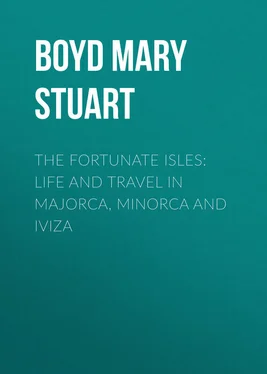Mary Boyd - The Fortunate Isles - Life and Travel in Majorca, Minorca and Iviza
Здесь есть возможность читать онлайн «Mary Boyd - The Fortunate Isles - Life and Travel in Majorca, Minorca and Iviza» — ознакомительный отрывок электронной книги совершенно бесплатно, а после прочтения отрывка купить полную версию. В некоторых случаях можно слушать аудио, скачать через торрент в формате fb2 и присутствует краткое содержание. ISBN: , Жанр: foreign_language, foreign_antique, foreign_prose, Путешествия и география, на английском языке. Описание произведения, (предисловие) а так же отзывы посетителей доступны на портале библиотеки ЛибКат.
- Название:The Fortunate Isles: Life and Travel in Majorca, Minorca and Iviza
- Автор:
- Жанр:
- Год:неизвестен
- ISBN:http://www.gutenberg.org/ebooks/39199
- Рейтинг книги:5 / 5. Голосов: 1
-
Избранное:Добавить в избранное
- Отзывы:
-
Ваша оценка:
- 100
- 1
- 2
- 3
- 4
- 5
The Fortunate Isles: Life and Travel in Majorca, Minorca and Iviza: краткое содержание, описание и аннотация
Предлагаем к чтению аннотацию, описание, краткое содержание или предисловие (зависит от того, что написал сам автор книги «The Fortunate Isles: Life and Travel in Majorca, Minorca and Iviza»). Если вы не нашли необходимую информацию о книге — напишите в комментариях, мы постараемся отыскать её.
The Fortunate Isles: Life and Travel in Majorca, Minorca and Iviza — читать онлайн ознакомительный отрывок
Ниже представлен текст книги, разбитый по страницам. Система сохранения места последней прочитанной страницы, позволяет с удобством читать онлайн бесплатно книгу «The Fortunate Isles: Life and Travel in Majorca, Minorca and Iviza», без необходимости каждый раз заново искать на чём Вы остановились. Поставьте закладку, и сможете в любой момент перейти на страницу, на которой закончили чтение.
Интервал:
Закладка:
After the Miramar had vanished into the darkness and the spectators had streamed towards the land, we still lingered on the breakwater. There was no moon, the stars were bright, the wavelets softly lapped the stones, and we felt placid and restful until quite suddenly we became aware that we were hungry.
Our proximity suggested the little shanty under the city wall by the sea, and thither we went.
It was the quiet hour there too. Except for three of the hussars we had seen before, the well-scrubbed tables were vacant. The soldiers, recognizing us, gave us friendly greeting, accompanied with the offer of their tobacco packets. Bright-eyed little Catalina ran to fetch the napkin, surely the sole emblem of gentility belonging to the establishment, and the señora herself appeared at the door of the shed, where she presided over the cooking-pots, to give us "Bona nit tengan" and to consult with us as to what we would like her to prepare.
She shook her head when we suggested beef-steaks and mushrooms. At that hour, apparently, beef was "off."
"Would we have soup? – Majorcan soup," she asked.
We shook our heads. No. We did not fancy soup.
Promising us fresh fish, and something with an untranslatable name, she disappeared into the shed. And, content to leave the selection to her, we awaited events.
The comrades in arms had gone, and a pale slender girl, beautiful in the small-featured, refined type so common in Palma, had taken her place at the next table. With her was a friend of the same style, but doubly attractive in that she was overflowing with vivacity. The younger girl sat silent, her hands folded, her head drooping, while the elder – who was knitting a petticoat gay with coloured stripes – chatted briskly. They did not eat, and we guessed they were waiting for some one to join them.
Sitting near them was a handsome taciturn man with a slouch hat, long curled moustaches, and a gaudy kerchief twisted about his neck. That the girls knew him was evident, for though he did not join in their conversation he seemed to listen to all that was said.
Just as we were served with crisp little fried fish, a figure, coming from the darkness where the waves were washing the stones, entered the circle of light. It was the expected man. Hanging up his rod and fishing basket, he took his place at the table beside the girls.
His skin was deeply bronzed, his garments were of blue cotton that sun and sea air had faded to a delicate hue. A scarlet sash was wound about his waist. His naked brown feet were thrust into string-soled green shoes.
Catalina, who had been watching for his arrival, ran out with a slender-spouted bottle of wine and three wooden spoons. Her mother followed close with an earthenware pipkin of the thick Majorcan soup that we had declined.
Grouped in an amicable trio, they ate from the same dish, and in turn drank from the slender spout of the green glass bottle. The pale girl remained pensively silent, but the other continued to talk, punctuating her conversation with dramatic movements of her hands. How we wished we could have understood what she was saying!
When the combined efforts of the three wooden spoons had searched the red earthenware vessel to its depths, the man who came from the sea rose and, lifting it in his hand without a word, walked to the edge of the water and threw the pipkin far into the Mediterranean. Then returning, he resumed his seat.
No one made any comment upon this inexplicable proceeding. Had the inoffending pipkin not been empty it might have seemed as though he were offering a libation to some unseen spirit of the water. But the actively plied spoons had succeeded in scooping out the last vestige of the soup.
In the meantime we had been occupied with our second course, which consisted of lengths of orange-coloured sausage, served hot with fried potatoes. And a new-comer, an old man, was eating a big plate of macaroni.
The nimble Catalina, flashing out, set a flat dish, heaped with some sort of stew, before the trio. What its contents were we could only guess. The lively maiden and the man were already poking among them with their wooden forks. The pensive girl had produced a silver fork and was delicately helping herself, fastidiously turning over the ingredients. The handsome reticent man sat motionless but observant.
They ate in leisurely fashion – nobody hurries in Palma. The gay girl rattled on in her musical voice, gesticulating with her pretty hands the while, only occasionally dropping the thread of her dramatic recital to send her fork foraging with the others, or to throw back her head and let the red wine trickle down her throat.
"Will he throw that dish away when it is empty?" we were wondering, when the señora, who was making a special effort on our behalf, appeared in person carrying a tempting combination of sweet peppers and young pork.
The question answered itself. When they had finished, the dish stood empty and ignored. The wine flask was refilled, and when we had paid our score – wine included, it came to about sevenpence each – we left the quartette still sitting under the flickering light by the edge of the unseen waves: the charming girl still lively, the pretty one distraite, the fisherman amiable, and the handsome listener still silently attentive.
It had been an odd little interlude – nothing to relate, indeed, but one of those petty excursions beyond one's own stereotyped world that make the observers feel, for the moment, as though they were living in somebody else's life, not in their own.
We finished the evening at what chanced to be the popular entertainment. If I remember correctly, it combined the attractions of a cinematograph and a variety show.
We were again out in the starlight, and walking briskly westwards towards Son Españolet, when the Boy said abruptly: —
"I wish I knew why that man threw the pipkin into the sea!"
IV
HOUSEKEEPING
Although, at Son Españolet, we were subject to no police or other rate, a small weekly tax was levied with extreme punctuality, on behalf of himself, by a functionary called the vigilante .
The most onerous labour of this alleged guardian of the public would appear to have been the collection, on Sunday mornings, of a penny from each householder. I trust I do not malign a worthy citizen, when I hint that these periodic visits were the only occasions on which most of his supporters were made conscious of the vigilante's existence.
His professed duties were to protect the interests of the residents in the district by prowling about at night, to escort timid wayfarers home by the light of his lantern, and, like the sereno , to call those who wished to be roused at an early hour. But what manner of need a community already rich in police, serenos , carabineros , and consumeros , had of a vigilante , was hard to imagine.
Nobody seemed to know who appointed the vigilantes . The Boy had a theory that our vigilante had assigned himself to the post, and that his sole exertion lay in calling to collect the fees.
On the morning of our first Sunday at the Casa Tranquila an imperative knock sounded at the front door. It was the vigilante , a good-looking white-bearded man clad in blue cotton. His designation was inscribed in bold letters on his cap-band. Having been forewarned of the custom, I handed over the expected ten centimos, which he accepted with the dignified courtesy of one who receives a right, and departed.
Two hours later the Boy, who had been out at the time of the visit, answered a second summons.
"It's the vigilante ," he said, returning to the veranda where we were sitting. "Has anybody got a copper?"
"But I gave the vigilante his penny this morning," I said, hastening to the door.
Читать дальшеИнтервал:
Закладка:
Похожие книги на «The Fortunate Isles: Life and Travel in Majorca, Minorca and Iviza»
Представляем Вашему вниманию похожие книги на «The Fortunate Isles: Life and Travel in Majorca, Minorca and Iviza» списком для выбора. Мы отобрали схожую по названию и смыслу литературу в надежде предоставить читателям больше вариантов отыскать новые, интересные, ещё непрочитанные произведения.
Обсуждение, отзывы о книге «The Fortunate Isles: Life and Travel in Majorca, Minorca and Iviza» и просто собственные мнения читателей. Оставьте ваши комментарии, напишите, что Вы думаете о произведении, его смысле или главных героях. Укажите что конкретно понравилось, а что нет, и почему Вы так считаете.











![John Bruce - The Lettsomian Lectures on Diseases and Disorders of the Heart and Arteries in Middle and Advanced Life [1900-1901]](/books/749387/john-bruce-the-lettsomian-lectures-on-diseases-and-disorders-of-the-heart-and-arteries-in-middle-and-advanced-life-1900-1901-thumb.webp)
